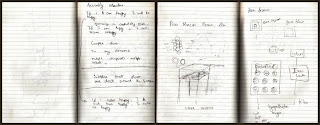Visiting Artist Lecture: Alexandre Singh: November 16, 2010 "Your work is all about language, narrative and evocation. Recently you performed at Renwick in New York, holding a fascinating lecture on dreams and imagination. That night, for a moment, I had the feeling you were like Mercutio telling about Queen Mab... I describe this thought pattern as “tangential logic”. In the systems of collages presented in the Assembly Instructions, as in the performances, I meander through ideas and suppositions that digress quickly from their departure point; sometimes they meet back up with a previously discarded sequence of ideas and flow off in another direction. Sometimes they just run into dead ends. I guess I could also call them academic daydreams." -Luigi Fassi
"Your work is all about language, narrative and evocation. Recently you performed at Renwick in New York, holding a fascinating lecture on dreams and imagination. That night, for a moment, I had the feeling you were like Mercutio telling about Queen Mab... I describe this thought pattern as “tangential logic”. In the systems of collages presented in the Assembly Instructions, as in the performances, I meander through ideas and suppositions that digress quickly from their departure point; sometimes they meet back up with a previously discarded sequence of ideas and flow off in another direction. Sometimes they just run into dead ends. I guess I could also call them academic daydreams." -Luigi Fassi
-These are the three words that Fassi chose to describe Singh's work. I wonder which three I will come up with.
"It’s all part of a plan, and it’s something I’m conscious of not only in my writing but in all the work that I’m making; that each work is a stepping stone to the next work, and to the next, each one more ambitious and more challenging to bring into being." -Fassi
-This is an important excerpt from Fassi because it is important to think of each work as part of something larger, rather than being solely a product of a final state. If one thinks of it as being an important by-product, then taking all the by-product and combining it into a better end product; that is the magic of not knowing what the end result will be. I am learning to embrace this thinking process.
[http://www.moussemagazine.it/articolo.mm?id=471] I really enjoy the fact that Singh has many of his journals scanned and uploaded for me to see. Fassi seems to be quite accurate with the words he chose to describe Singh's work. What fascinates me is being able to 'turn page after page' and see how Singh's idea flow from thought to thought. I am curious to how he will present this information as a coherent piece of work.
I really enjoy the fact that Singh has many of his journals scanned and uploaded for me to see. Fassi seems to be quite accurate with the words he chose to describe Singh's work. What fascinates me is being able to 'turn page after page' and see how Singh's idea flow from thought to thought. I am curious to how he will present this information as a coherent piece of work.
1. How do you go about organizing these pages of thoughts? Or how does your filtering process work to narrow down and focus from all these pages?
2. Do you think it would benefit the viewer to look through these notes before viewing the 'edited' work? Are there any effects on how the work will be perceived or are these pages irrelevant to the final product of your work?
Site for which the journal pages were founded:
[http://www.preromanbritain.com/alex/notes03/large-36.html]
Sunday, November 14, 2010
alexandre singh: lecture questions and response
Posted by Lanvi T. Nguyen at 7:32 PM
Labels: artist lecture

0 comments:
Post a Comment